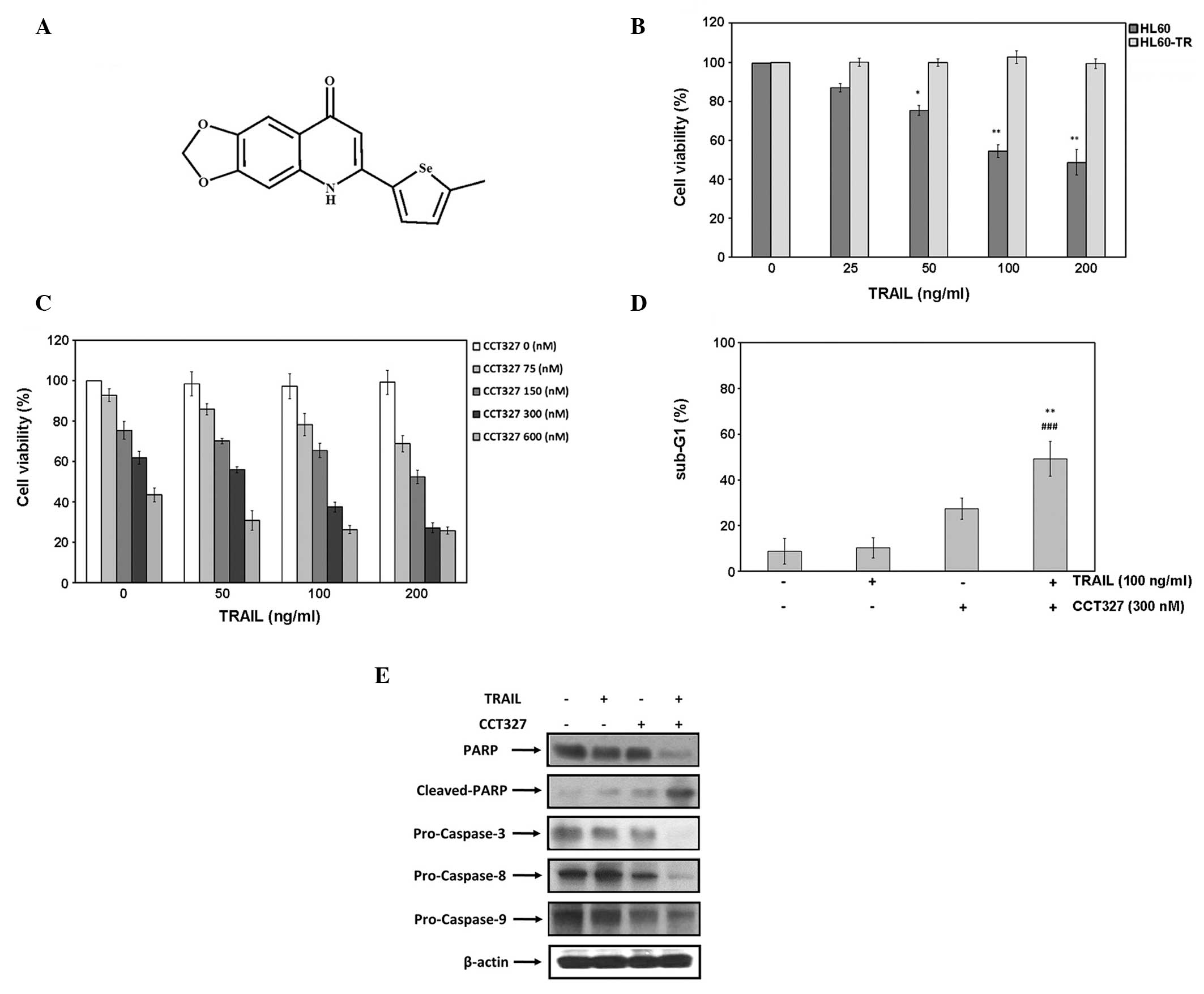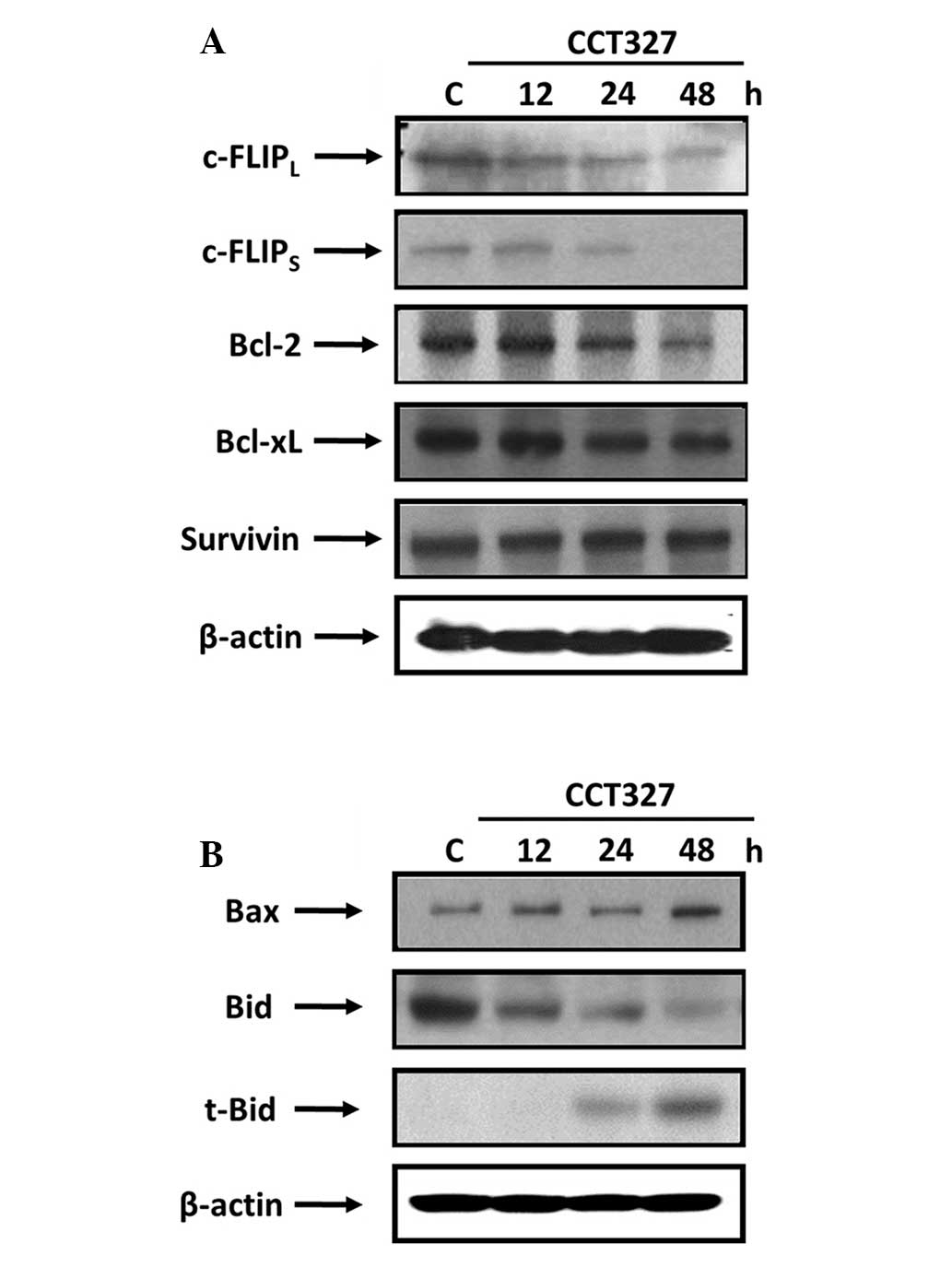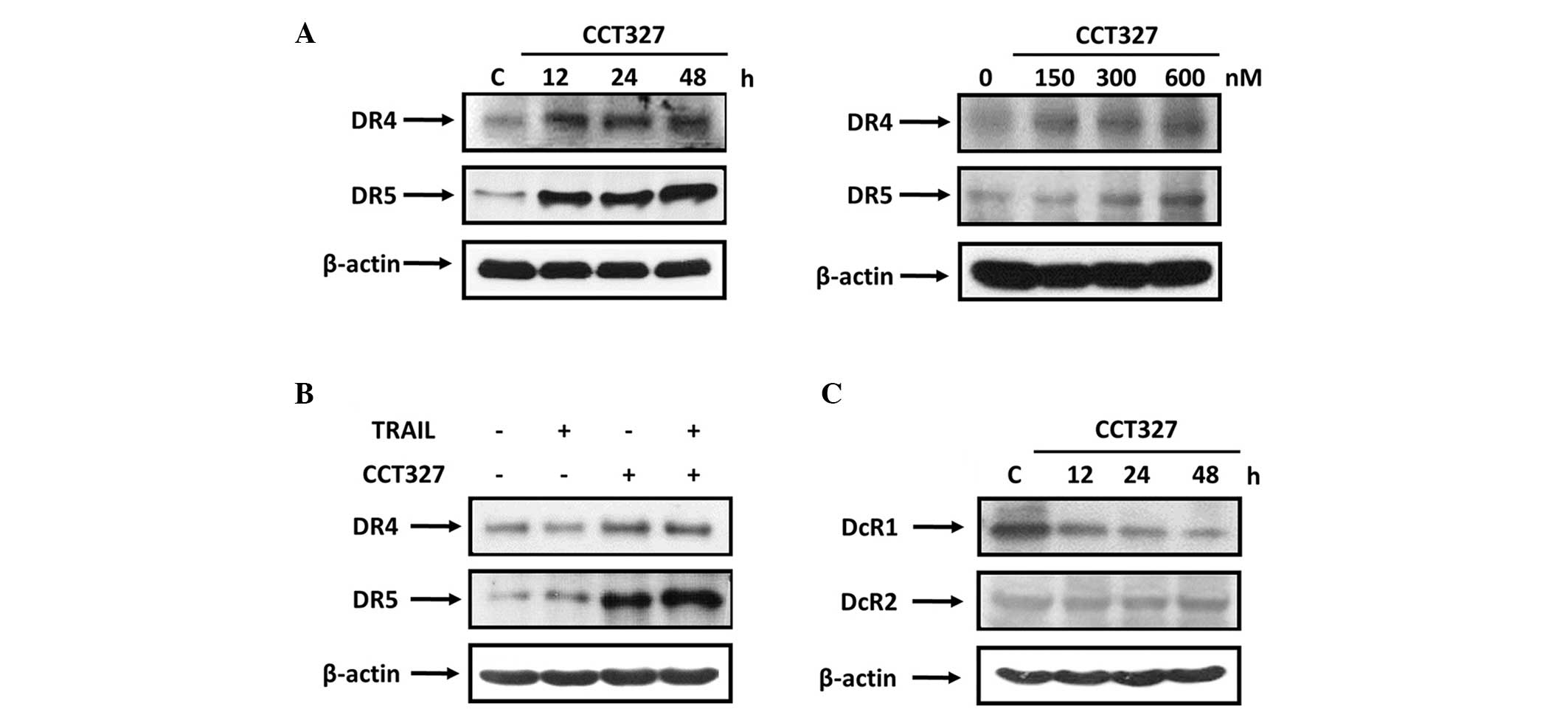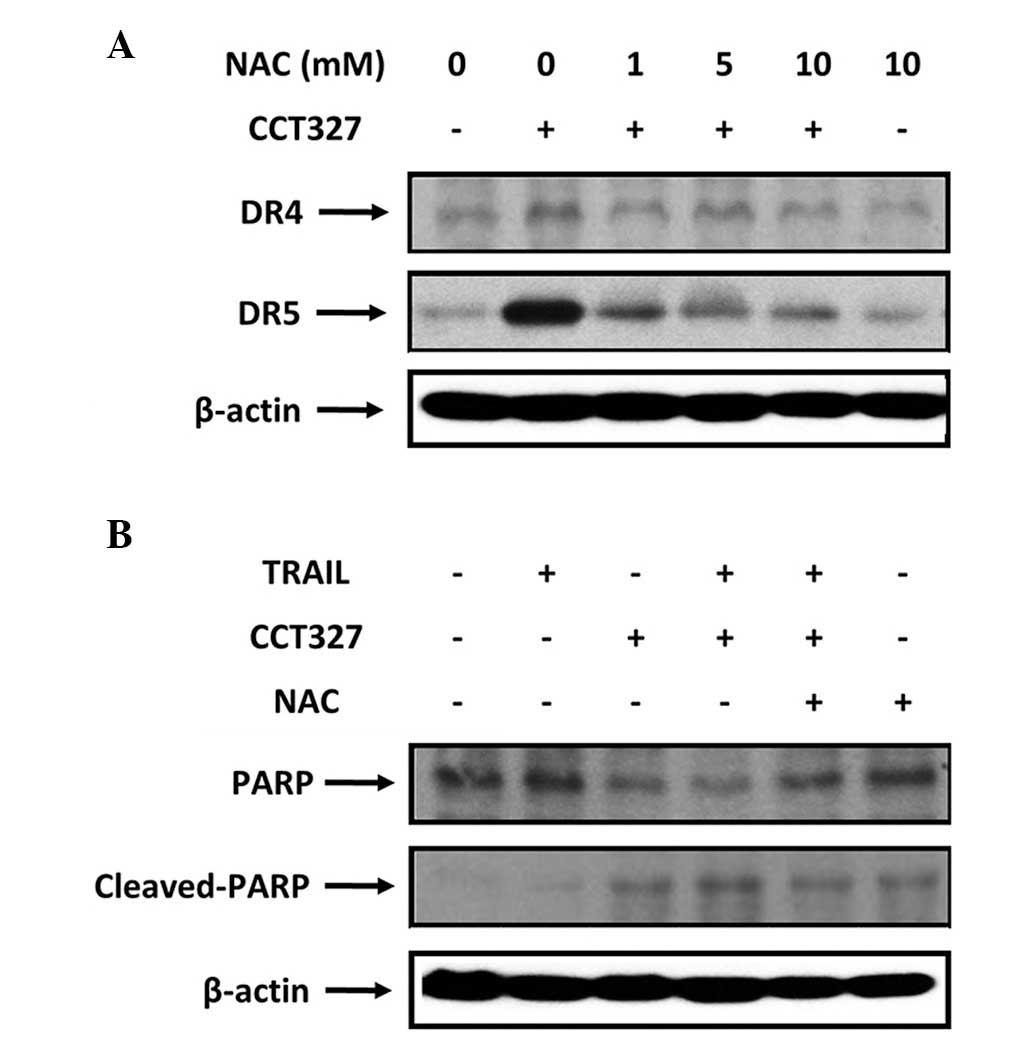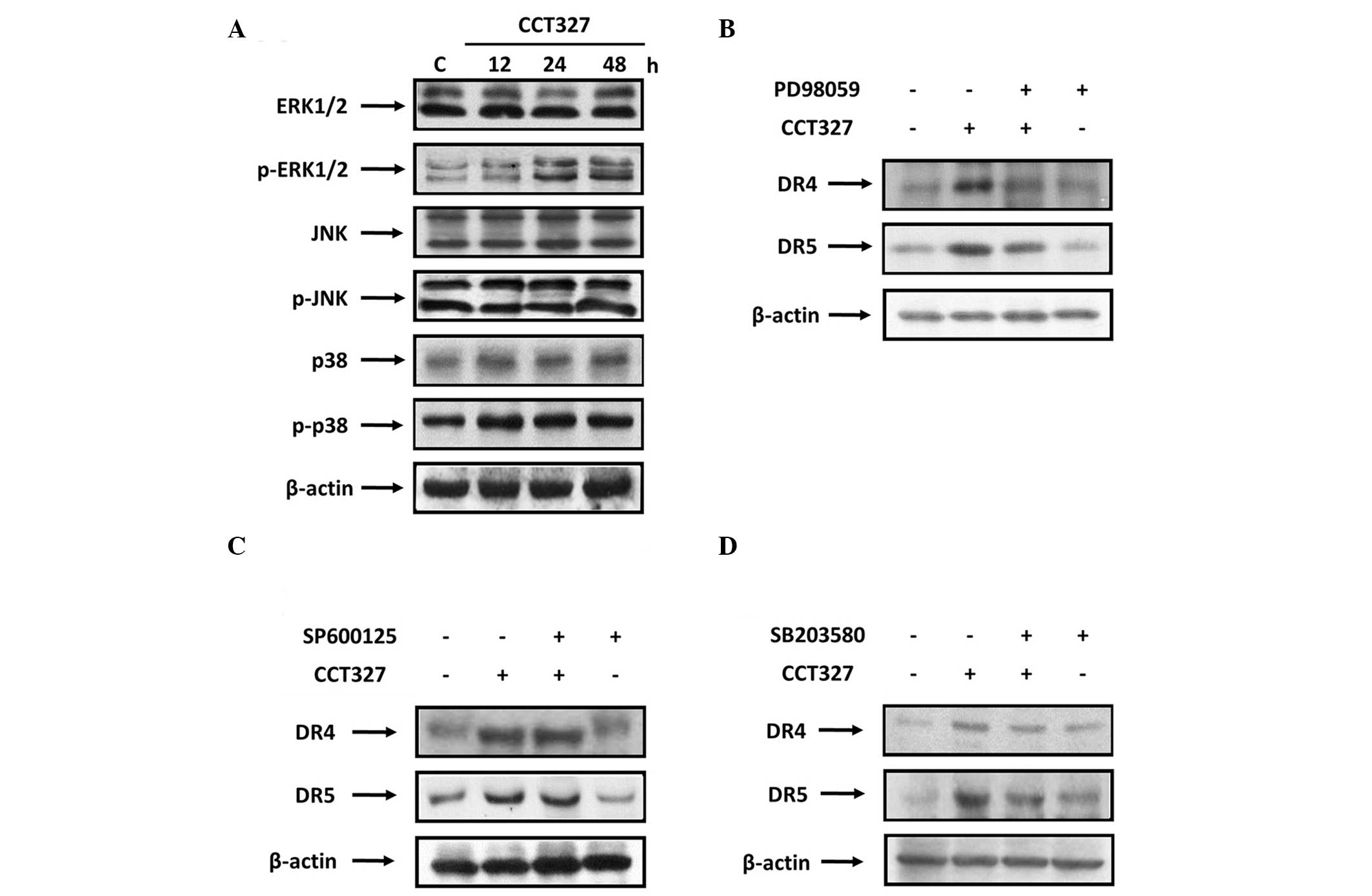|
1
|
Wiley SR, Schooley K, Smolak PJ, Din WS,
Huang CP, Nicholl JK, Sutherland GR, Smith TD, Rauch C and Smith
CA: Identification and characterization of a new member of the TNF
family that induces apoptosis. Immunity. 3:673–682. 1995.
View Article : Google Scholar : PubMed/NCBI
|
|
2
|
Pitti RM, Marsters SA, Ruppert S, Donahue
CJ, Moore A and Ashkenazi A: Induction of apoptosis by Apo-2
ligand, a new member of the tumor necrosis factor cytokine family.
J Biol Chem. 271:12687–12690. 1996. View Article : Google Scholar : PubMed/NCBI
|
|
3
|
Ashkenazi A, Pai RC, Fong S, Leung S,
Lawrence DA, Marsters SA, Blackie C, Chang L, McMurtrey AE, Hebert
A, DeForge L, Koumenis IL, Lewis D, Harris L, Bussiere J, Koeppen
H, Shahrokh Z and Schwall RH: Safety and antitumor activity of
recombinant soluble Apo2 ligand. J Clin Invest. 104:155–162. 1999.
View Article : Google Scholar : PubMed/NCBI
|
|
4
|
Walczak H, Miller RE, Ariail K, Gliniak B,
Griffith TS, Kubin M, Chin W, Jones J, Woodward A, Le T, Smith C,
Smolak P, Goodwin RG, Rauch CT, Schuh JC and Lynch DH: Tumoricidal
activity of tumor necrosis factor-related apoptosis-inducing ligand
in vivo. Nat Med. 5:157–163. 1999. View Article : Google Scholar : PubMed/NCBI
|
|
5
|
Plummer R, Attard G, Pacey S, Li L, Razak
A, Perrett R, Barrett M, Judson I, Kaye S, Fox NL, Halpern W, Corey
A, Calvert H and de Bono J: Phase 1 and pharmacokinetic study of
lexatumumab in patients with advanced cancers. Clin Cancer Res.
13:6187–6194. 2007. View Article : Google Scholar : PubMed/NCBI
|
|
6
|
Hotte SJ, Hirte HW, Chen EX, Siu LL, Le
LH, Corey A, Iacobucci A, MacLean M, Lo L, Fox NL and Oza AM: A
phase 1 study of mapatumumab (fully human monoclonal antibody to
TRAIL-R1) in patients with advanced solid malignancies. Clin Cancer
Res. 14:3450–3455. 2008. View Article : Google Scholar : PubMed/NCBI
|
|
7
|
Camidge DR, Herbst RS, Gordon MS, Eckhardt
SG, Kurzrock R, Durbin B, Ing J, Tohnya TM, Sager J, Ashkenazi A,
Bray G and Mendelson D: A phase I safety and pharmacokinetic study
of the death receptor 5 agonistic antibody PRO95780 in patients
with advanced malignancies. Clin Cancer Res. 16:1256–1263. 2010.
View Article : Google Scholar : PubMed/NCBI
|
|
8
|
Forero-Torres A, Infante JR, Waterhouse D,
Wong L, Vickers S, Arrowsmith E, He AR, Hart L, Trent D, Wade J,
Jin X, Wang Q, Austin T, Rosen M, Beckman R, von Roemeling R,
Greenberg J and Saleh M: Phase 2, multicenter, open-label study of
tigatuzumab (CS-1008), a humanized monoclonal antibody targeting
death receptor 5, in combination with gemcitabine in
chemotherapy-naive patients with unresectable or metastatic
pancreatic cancer. Cancer Med. 2:925–932. 2013. View Article : Google Scholar
|
|
9
|
Ashkenazi A and Dixit VM: Apoptosis
control by death and decoy receptors. Curr Opin Cell Biol.
11:255–260. 1999. View Article : Google Scholar : PubMed/NCBI
|
|
10
|
Pan G, Ni J, Wei YF, Yu G, Gentz R and
Dixit VM: An antagonist decoy receptor and a death
domain-containing receptor for TRAIL. Science. 277:815–818. 1997.
View Article : Google Scholar : PubMed/NCBI
|
|
11
|
Pan G, Ni J, Yu G, Wei YF and Dixit VM:
TRUNDD, a new member of the TRAIL receptor family that antagonizes
TRAIL signalling. FEBS Lett. 424:41–45. 1998. View Article : Google Scholar : PubMed/NCBI
|
|
12
|
Sheridan JP, Marsters SA, Pitti RM, Gurney
A, Skubatch M, Baldwin D, Ramakrishnan L, Gray CL, Baker K, Wood
WI, Goddard AD, Godowski P and Ashkenazi A: Control of
TRAIL-induced apoptosis by a family of signaling and decoy
receptors. Science. 277:8181997. View Article : Google Scholar : PubMed/NCBI
|
|
13
|
Muzio M, Chinnaiyan AM, Kischkel FC,
O’Rourke K, Shevchenko A, Ni J, Scaffidi C, Bretz JD, Zhang M,
Gentz R, Mann M, Krammer PH, Peter ME and Dixit VM: FLICE, a novel
FADD-homologous ICE/CED-3-like protease, is recruited to the CD95
(Fas/APO-1) death - inducing signaling complex. Cell. 85:817–827.
1996. View Article : Google Scholar : PubMed/NCBI
|
|
14
|
Chaudhary PM, Eby M, Jasmin A, Bookwalter
A, Murray J and Hood L: Death receptor 5, a new member of the TNFR
family, and DR4 induce FADD-dependent apoptosis and activate the
NF-κB pathway. Immunity. 7:821–830. 1997.PubMed/NCBI
|
|
15
|
Aggarwal BB: Signalling pathways of the
TNF superfamily: a double-edged sword. Nat Rev Immunol. 3:745–756.
2003. View
Article : Google Scholar : PubMed/NCBI
|
|
16
|
Ashkenazi A, Holland P and Eckhardt SG:
Ligand-based targeting of apoptosis in cancer: the potential of
recombinant human apoptosis ligand 2/Tumor necrosis factor-related
apoptosis-inducing ligand (rhApo2L/TRAIL). J Clin Oncol.
26:3621–3630. 2008. View Article : Google Scholar
|
|
17
|
Srivastava RK: TRAIL/Apo-2L: mechanisms
and clinical applications in cancer. Neoplasia. 3:535–546. 2001.
View Article : Google Scholar : PubMed/NCBI
|
|
18
|
Suliman A, Lam A, Datta R and Srivastava
RK: Intracellular mechanisms of TRAIL: apoptosis through
mitochondrial-dependent and -independent pathways. Oncogene.
20:2122–2133. 2001. View Article : Google Scholar : PubMed/NCBI
|
|
19
|
Tsujimoto Y and Shimizu S: Bcl-2 family:
life-or-death switch. FEBS Lett. 466:6–10. 2000. View Article : Google Scholar : PubMed/NCBI
|
|
20
|
Igney FH and Krammer PH: Death and
anti-death: tumour resistance to apoptosis. Nat Rev Cancer.
2:277–288. 2002. View
Article : Google Scholar : PubMed/NCBI
|
|
21
|
Zhang L and Fang B: Mechanisms of
resistance to TRAIL-induced apoptosis in cancer. Cancer Gene Ther.
12:228–237. 2005. View Article : Google Scholar : PubMed/NCBI
|
|
22
|
Irmler M, Thome M, Hahne M, Schneider P,
Hofmann K, Steiner V, Bodmer JL, Schröter M, Burns K, Mattmann C,
Rimoldi D, French LE and Tschopp J: Inhibition of death receptor
signals by cellular FLIP. Nature. 388:190–195. 1997. View Article : Google Scholar : PubMed/NCBI
|
|
23
|
Griffith TS, Chin WA, Jackson GC, Lynch DH
and Kubin MZ: Intracellular regulation of TRAIL-induced apoptosis
in human melanoma cells. J Immunol. 161:2833–2840. 1998.PubMed/NCBI
|
|
24
|
Krueger A, Baumann S, Krammer PH and
Kirchhoff S: FLICE-inhibitory proteins: regulators of death
receptor mediated apoptosis. Mol Cell Biol. 21:8247–8254. 2001.
View Article : Google Scholar : PubMed/NCBI
|
|
25
|
Safa AR, Day TW and Wu CH: Cellular
FLICE-like inhibitory protein (C-FLIP): a novel target for cancer
therapy. Curr Cancer Drug Targets. 8:37–46. 2008. View Article : Google Scholar : PubMed/NCBI
|
|
26
|
Cimino F, Esposito F, Ammendola R and
Russo T: Gene regulation by reactive oxygen species. Curr Top Cell
Regul. 35:123–148. 1997. View Article : Google Scholar : PubMed/NCBI
|
|
27
|
Dalton TP, Shertzer HG and Puga A:
Regulation of gene expression by reactive oxygen. Annu Rev
Pharmacol Toxicol. 39:67–101. 1999. View Article : Google Scholar : PubMed/NCBI
|
|
28
|
Sakon S, Xue X, Takekawa M, Sasazuki T,
Okazaki T, Kojima Y, Piao JH, Yagita H, Okumura K, Doi T and Nakano
H: NF-kappaB inhibits TNF-induced accumulation of ROS that mediate
prolonged MAPK activation and necrotic cell death. EMBO J.
22:3898–3909. 2003. View Article : Google Scholar : PubMed/NCBI
|
|
29
|
Ventura JJ, Cogswell P, Flavell RA,
Baldwin AS Jr and Davis RJ: JNK potentiates TNF-stimulated necrosis
by increasing the production of cytotoxic reactive oxygen species.
Gene Dev. 18:2905–2915. 2004. View Article : Google Scholar : PubMed/NCBI
|
|
30
|
Kamata H, Honda S, Maeda S, Chang L,
Hirata H and Karin M: Reactive oxygen species promote
TNFalpha-induced death and sustained JNK activation by inhibiting
MAP kinase phosphatases. Cell. 120:649–661. 2005. View Article : Google Scholar : PubMed/NCBI
|
|
31
|
Zhou JY, Liu Y and Wu GS: The role of
mitogen-activated protein kinase phosphatase-1 in oxidative
damage-induced cell death. Cancer Res. 66:4888–4894. 2006.
View Article : Google Scholar : PubMed/NCBI
|
|
32
|
Hara H, Ohta M, Ohta K, Kuno S and Adachi
T: Increase of antioxidative potential by tert-butylhydroquinone
protects against cell death associated with
6-hydroxydopamine-induced oxidative stress in neuroblastoma SH-SY5Y
cells. Brain Res Mol Brain Res. 119:125–131. 2003. View Article : Google Scholar : PubMed/NCBI
|
|
33
|
Jiang H, Ren Y, Zhao J and Feng J: Parkin
protects human dopaminergic neuroblastoma cells against
dopamine-induced apoptosis. Hum Mol Genet. 13:1745–1754. 2004.
View Article : Google Scholar : PubMed/NCBI
|
|
34
|
Kyriakis JM, Banerjee P, Nikolakaki E, Dai
T, Rubie EA, Ahmad MF, Avruch J and Woodgett JR: The
stress-activated protein kinase subfamily of c-Jun kinases. Nature.
369:156–160. 1994. View Article : Google Scholar : PubMed/NCBI
|
|
35
|
Raingeaud J, Gupta S, Rogers JS, Dickens
M, Han J, Ulevitch RJ and Davis RJ: Pro-inflammatory cytokines and
environmental stress cause p38 mitogen-activated protein kinase
activation by dual phosphorylation on tyrosine and threonine. J
Biol Chem. 270:7420–7426. 1995. View Article : Google Scholar : PubMed/NCBI
|
|
36
|
Dérijard B, Hibi M, Wu IH, Barrett T, Su
B, Deng T, Karin M and Davis RJ: JNK1: a protein kinase stimulated
by UV light and Ha-Ras that binds and phosphorylates the c-Jun
activation domain. Cell. 76:1025–1037. 1994.PubMed/NCBI
|
|
37
|
Eliopoulos AG, Gallagher NJ, Blake SM,
Dawson CW and Young LS: Activation of the p38 mitogen-activated
protein kinase pathway by Epstein-Barr virus-encoded latent
membrane protein 1 coregulates interleukin-6 and interleukin-8
production. J Biol Chem. 274:16085–16096. 1999. View Article : Google Scholar
|
|
38
|
Wang WH, Gregori G, Hullinger RL and
Andrisani OM: Sustained activation of p38 mitogen-activated protein
kinase and c-Jun N-terminal kinase pathways by hepatitis B virus X
protein mediates apoptosis via induction of Fas/FasL and tumor
necrosis factor (TNF) receptor 1/TNF-alpha expression. Mol Cell
Biol. 24:10352–10365. 2004. View Article : Google Scholar
|
|
39
|
Nakshatri H, Rice SE and Bhat-Nakshatri P:
Antitumor agent parthenolide reverses resistance of breast cancer
cells to tumor necrosis factor-related apoptosis-inducing ligand
through sustained activation of c-Jun N-terminal kinase. Oncogene.
23:7330–7344. 2004. View Article : Google Scholar
|
|
40
|
Kuo SC, Lee HZ, Juang JP, Lin YT, Wu TS,
Chang JJ, Lednicer D, Paull KD, Lin CM, Hamel E, et al: Synthesis
and cytotoxicity of 1,6,7,8-substituted 2-(4′-substituted
phenyl)-4-quinolones and related compounds: identification as
antimitotic agents interacting with tubulin. J Med Chem.
36:1146–1156. 1993.
|
|
41
|
Chen CT, Hsu MH, Cheng YY, Liu CY, Chou
LC, Huang LJ, Wu TS, Yang X, Lee KH and Kuo SC: Synthesis and in
vitro anticancer activity of 6,7-methylenedioxy (or
5-hydroxy-6-methoxy)-2-(substituted selenophenyl) quinolin-4-one
analogs. Eur J Med Chem. 46:6046–6056. 2011.
|
|
42
|
Cheng J, Hylander BL, Baer MR, Chen X and
Repasky EA: Multiple mechanisms underlie resistance of leukemia
cells to Apo2 Ligand/TRAIL. Mol Cancer Ther. 5:1844–1853. 2006.
View Article : Google Scholar : PubMed/NCBI
|
|
43
|
Lin VC, Chou CH, Lin YC, Lin JN, Yu CC,
Tang CH, Lin HY and Way TD: Osthole suppresses fatty acid synthase
expression in HER2-overexpressing breast cancer cells through
modulating Akt/mTOR pathway. J Agric Food Chem. 58:4786–4793. 2010.
View Article : Google Scholar : PubMed/NCBI
|
|
44
|
Pan G, O’Rourke K, Chinnaiyan AM, Gentz R,
Ebner R, Ni J and Dixit VM: The receptor for the cytotoxic ligand
TRAIL. Science. 276:111–113. 1997. View Article : Google Scholar : PubMed/NCBI
|
|
45
|
Walczak H, Degli-Esposti MA, Johnson RS,
Smolak PJ, Waugh JY, Boiani N, Timour MS, Gerhart MJ, Schooley KA,
Smith CA, Goodwin RG and Rauch CT: TRAIL-R2: a novel
apoptosis-mediating receptor for TRAIL. EMBO J. 16:5386–5397. 1997.
View Article : Google Scholar : PubMed/NCBI
|
|
46
|
Daniel PT, Wieder T, Sturm I and
Schulze-Osthoff K: The kiss of death: promises and failures of
death receptors and ligands in cancer therapy. Leukemia.
15:1022–1032. 2001. View Article : Google Scholar : PubMed/NCBI
|
|
47
|
Ohtsuka T and Zhou T: Bisindolylmaleimide
VIII enhances DR5-mediated apoptosis through the MKK4/JNK/p38
kinase and the mitochondrial pathways. J Biol Chem.
277:29294–29303. 2002. View Article : Google Scholar : PubMed/NCBI
|
|
48
|
Izeradjene K, Douglas L, Tillman DM,
Delaney AB and Houghton JA: Reactive oxygen species regulate
caspase activation in tumor necrosis factor-related
apoptosis-inducing ligand-resistant human colon carcinoma cell
lines. Cancer Res. 65:7436–7445. 2005. View Article : Google Scholar
|
|
49
|
Shenoy K, Wu Y and Pervaiz S: LY303511
enhances TRAIL sensitivity of SHEP-1 neuroblastoma cells via
hydrogen peroxide-mediated mitogen-activated protein kinase
activation and up-regulation of death receptors. Cancer Res.
69:1941–1950. 2009. View Article : Google Scholar
|
|
50
|
Yodkeeree S, Sung B, Limtrakul P and
Aggarwal BB: Zerumbone enhances TRAIL-induced apoptosis through the
induction of death receptors in human colon cancer cells: Evidence
for an essential role of reactive oxygen species. Cancer Res.
69:6581–6589. 2009. View Article : Google Scholar
|
|
51
|
Prasad S, Yadav VR, Ravindran J and
Aggarwal BB: ROS and CHOP are critical for dibenzylideneacetone to
sensitize tumor cells to TRAIL through induction of death receptors
and downregulation of cell survival proteins. Cancer Res.
71:538–549. 2011. View Article : Google Scholar : PubMed/NCBI
|
|
52
|
Kang CH, Moon DO, Choi YH, Choi IW, Moon
SK, Kim WJ and Kim GY: Piceatannol enhances TRAIL-induced apoptosis
in human leukemia THP-1 cells through Sp1- and ERK-dependent DR5
up-regulation. Toxicol In Vitro. 25:605–612. 2011. View Article : Google Scholar : PubMed/NCBI
|
|
53
|
Johnstone RW, Frew AJ and Smyth MJ: The
TRAIL apoptotic pathway in cancer onset, progression and therapy.
Nat Rev Cancer. 8:782–798. 2008. View Article : Google Scholar : PubMed/NCBI
|
|
54
|
Jacobson MD: Reactive oxygen species and
programmed cell death. Trends Biochem Sci. 21:83–86. 1996.
View Article : Google Scholar : PubMed/NCBI
|
|
55
|
Yoon MJ, Kang YJ, Kim IY, Kim EH, Lee JA,
Lim JH, Kwon TK and Choi KS: Monensin, a polyether ionophore
antibiotic, overcomes TRAIL resistance in glioma cells via
endoplasmic reticulum stress, DR5 upregulation and c-FLIP
downregulation. Carcinogenesis. 34:1918–1928. 2013. View Article : Google Scholar : PubMed/NCBI
|
|
56
|
Newmeyer DD and Ferguson-Miller S:
Mitochondria: releasing power for life and unleashing the
machineries of death. Cell. 112:481–490. 2003. View Article : Google Scholar : PubMed/NCBI
|















